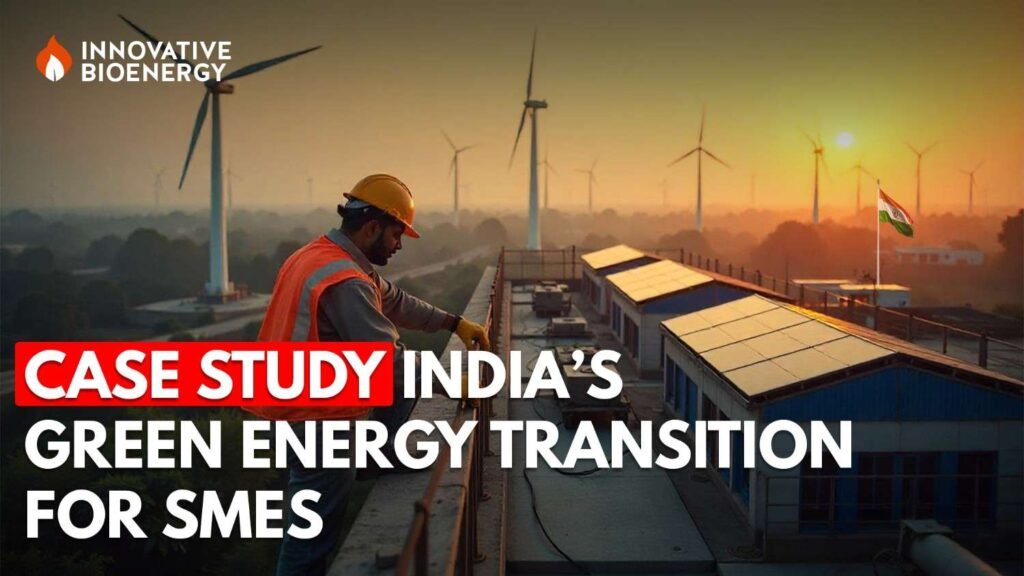India’s Small and Medium Enterprises (SMEs) are a vital engine of India’s economy, contributing nearly 30% of GDP, 45% of manufacturing output, and employing over 260 million people. However, many SMEs continue to face a significant challenge: high energy consumption and carbon emissions due to reliance on outdated, inefficient technologies.
This results in excessive energy costs and environmental pollution, threatening their competitiveness and India’s climate goals. Limited access to finance, low awareness, and insufficient government support further complicate their transition to cleaner energy sources.
Let’s explore how India’s SMEs are overcoming these challenges by adopting green energy solutions, including bioenergy, and how government initiatives are accelerating this sustainable transformation.
Why India’s SMEs Are Central to the Green Energy Transition
SMEs contribute 10-15% of India’s industrial sector emissions, accounting for about 3-4% of the country’s total carbon dioxide output. Given their scale, greening SMEs is crucial for India to meet its net-zero emissions target by 2070. The transition to renewable energy, energy efficiency, and bioenergy solutions can significantly reduce their carbon footprint while improving operational costs and competitiveness.
Bioenergy: A Key Component of India’s Green Energy Strategy for SMEs
Bioenergy is emerging as a vital renewable energy source for Indian SMEs. The National Bioenergy Programme, extended through 2025-26, promotes the adoption of biomass energy, biogas, bio-CNG, and waste-to-energy technologies. These solutions help SMEs convert agricultural residue, organic waste, and biomass into clean energy, reducing dependence on fossil fuels.
- Biomass Energy: SMEs in sectors like textiles and chemicals are increasingly using biomass briquettes and pellets for power generation. Central Financial Assistance (CFA) is available for setting up biomass-based cogeneration plants, making it cost-effective for SMEs to adopt biomass energy solutions. These initiatives pave the way for cost-effective bioenergy solutions for Indian SMEs, especially in energy-intensive sectors like textiles and chemicals.
- Biogas and Bio-CNG: The government supports large biogas and bio-CNG plants, enabling SMEs to convert organic waste into clean fuel for heating and power.
- Waste-to-Energy Projects: These initiatives help small industries manage waste sustainably while generating energy, especially in states like Maharashtra, Gujarat, Tamil Nadu, and Karnataka.
Government Initiatives Supporting Bioenergy and Green Energy Adoption
| Initiative | Description | Impact |
| National Bioenergy Programme | Supports biomass, biogas, and bio-CNG projects with financial incentives | Enables SMEs to adopt bioenergy solutions |
| PM Surya Ghar Yojana | Promotes rooftop solar installations for SMEs | Reduces energy costs and carbon footprint |
| MSME Sustainable (ZED) Certification | Recognizes and incentivizes energy-efficient and green MSMEs | Encourages sustainable business practices |
| Bureau of Energy Efficiency (BEE) Program | Provides energy audits, capacity building, and financial support for technology upgrades | Helps SMEs save energy and costs |
| State Policies (e.g., Madhya Pradesh Renewable Energy Policy 2025) | Offers capital subsidies and incentives for biofuel plants, including bio-coal and compressed biogas | Boosts regional bioenergy adoption |
Regional and Sectoral Leadership in Bioenergy Adoption
- Gujarat and Maharashtra: These states lead in biomass energy adoption among SMEs, especially in textile and chemical clusters.
- Tamil Nadu and Karnataka: Emerging as strong players in waste-to-energy and biogas projects for small businesses.
- Textile Industry: This sector is pioneering the use of biomass briquettes and biogas for process heating, reducing fossil fuel use.
- Rural Businesses: In Uttar Pradesh, Madhya Pradesh, and other states, bioenergy projects are creating new income streams and improving energy access.
Benefits of Bioenergy and Green Energy for SMEs
- Cost Savings: SMEs can reduce energy bills by up to 30% through bioenergy and solar adoption, with payback periods of 3-5 years.
- Emission Reduction: Transitioning to bioenergy can lower CO₂ emissions by over 100 million tonnes annually across the SME sector.
- Energy Security: Bioenergy provides a reliable, locally sourced energy option, reducing dependence on grid electricity and fossil fuels. For a deeper understanding, see our Comparison: Biomass vs Fossil Fuels article, where we explore efficiency, cost, and environmental impact side by side.
- Competitive Advantage: Green businesses are better positioned to meet international standards and access global markets.
Challenges and the Way Forward
Despite progress, challenges remain:
- Many SMEs still lack access to affordable finance for bioenergy projects.
- Awareness about bioenergy benefits and technologies is limited.
- Sector-specific technical guidance and scalable solutions are needed.
Addressing these gaps through enhanced government support, innovative financing, and capacity-building programs will accelerate the green energy transition for SMEs.
Conclusion
India’s SMEs are embracing a multi-faceted green energy transition, with bioenergy playing a crucial role alongside solar and energy efficiency measures. Supported by robust government initiatives and regional leadership, SMEs are reducing costs, cutting emissions, and enhancing competitiveness. This transition not only helps India meet its climate commitments but also drives sustainable economic growth.
Innovative Bioenergy is proud to support this transformation by supplying high-quality wood pellets and wood briquettes to both SMEs and large-scale industrial operations. Our biomass fuels are engineered for high combustion efficiency, cost savings, and environmental impact, making them ideal for businesses aiming to transition away from fossil fuels.
Choose Innovative Bioenergy for a reliable biomass fuel supply and expert support tailored to your industry.



